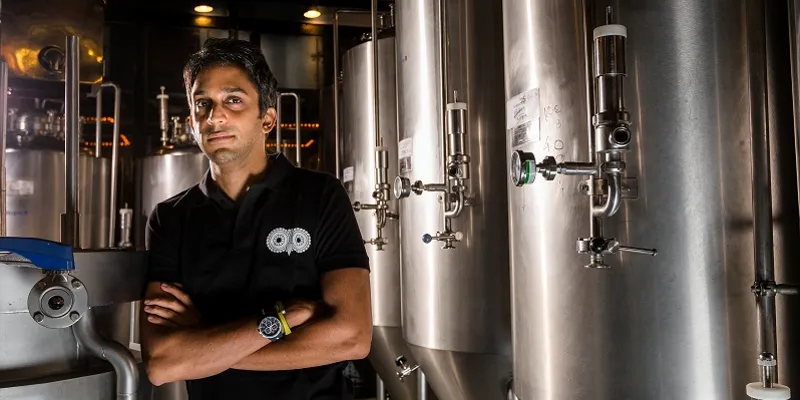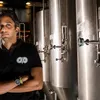‘We’ve recovered’: How Indian craft beer brands survived COVID-19 impact, became bullish about growth
Most craft beer brands saw a significant drop in revenue when COVID-19 hit India. The damage was seemingly irreversible. Or was it? This International Beer Day, read how these craft beer brands survived one of their most challenging phases.
India’s largest alcobev firm, United Breweries Limited (UBL), is considered a sort of benchmark or yardstick for the health of the nation’s beer industry.
When its iconic brand of Kingfisher beer sees growth, it bodes well for India’s market and its numerous brands of beer.
But when its sales plummet, watch out!
This is what happened when UBL posted its Q1 results for FY21 - the first quarterly results since the COVID-19 pandemic enveloped India and took away the peak beer season months from March to June.
UBL’s revenue from operations slipped 73 percent to Rs 1,262.82 crore from Rs 4,708.42 crore in the corresponding quarter in FY20.
Mirroring UBL, several craft beer brands reported they saw a significant drop in revenue during the quarter. Although the situation improved over the next few months as lockdown restrictions were eased and demand returned, the damage was seemingly irreversible.
Or was it?

Infographic design by Manash Pratim
UBL’s decline
Javed Murad, founder at Mumbai-based craft beer brand White Owl, says: “Severe COVID-19 caseloads in urban areas resulted in liquor distribution outlets, microbreweries, and restaurants being shut down. Even the biggest brand - Kingfisher - was down significantly. Core sales coming from the summer months were lost.”
In FY20, UBL’s revenue from sales (including excise duty) was Rs 14,646.46 crore and it recorded profit of Rs 427.23 crore for the year.
But in FY21, on account of the impact of nation-wide lockdowns, its revenue (including excise duty) dropped to Rs 10,183.40 crore - a 30.47 percent decrease from the previous year. Its profits dropped to Rs 112.85 crore - a 73.58 percent decline.
White Owl saw a similar decline in revenue. Som Distilleries, which manufactures and sells White Owl beer, sold 82,333 cases of White Owl beer in FY20. For FY21, Javed says White Owl’s sales volumes declined 30 percent.
These figures could have been worse if White Owl, like other beer brands, had not seen a recovery in January, February, and March 2021.
As restrictions on distribution outlets and restaurants were completely lifted during these months, Javed claims White Owl saw a 60 percent increase in sales compared to Q4 of the previous year.
And although the second wave of COVID-19 in 2021 placed craft beer brands in a similar situation as last year, they are now more optimistic for the future.
“July 2021 was much better than anticipated. Although our Western markets in Pune, Mumbai, and Goa are still a bit shaky, we've seen recovery in North and South Indian markets. Hopefully, there will be no third wave, and by the end of the year, White Owl will be back on track towards our pre-COVID growth plans,” Javed says.

Javed Murad, Founder, White Owl
Medusa’s approach
Like White Owl, many other new age beer brands do not own manufacturing facilities and full-scale breweries. Medusa and Bad Monkey are examples of beer brands that are focusing on a lease-based or contracting manufacturing model respectively.
This helps them limit their investments in setting up breweries - a huge expense that can amount to several crore rupees, depending on the size.
“We have taken a lease licence for the last two years and shifted from a contract-based model. Our brewery is in Punjab. Since we don’t have to spend crores on a brewery, we can instead spend it on brand development and focusing on meeting pre-COVID levels, if not managing to grow,” Medusa Founder Avneet Singh says.
Meeting pre-COVID levels is exactly what Avneet claims Medusa has done. According to him, brand sales have been largely consistent between FY20 and FY21.
“Until the COVID-19 pandemic hit, we were growing the brand. Last year, we did not grow. Although the overall beer industry took a 30 percent hit, we managed to clock similar sales of around Rs 51 crore each in FY20 and FY21. We’ve recovered,” he says.
Avneet remains bullish on the future of the beer industry, even as the impact of the second wave has passed. “After every pandemic, liquor and hospitality sectors boom. There is no doubt about it,” he adds.

Avneet Singh, Founder, Medusa Beverages
Holding off on expansion
New-age beer brands consider manufacturing on contract basis especially critical when expanding into new state markets, as it is often not economical to invest in setting up a brand new manufacturing facility. Further, acquiring licences to manufacture in new markets and states can be difficult.
For Delhi-based Bad Monkey Beer, contract manufacturing held the golden ticket for its entry into South Indian states of Telangana and Karnataka.
“We sold around 6.5 lakh cases of beer annually in Delhi, UP, Uttarakhand, and Chhattisgarh. We wanted to enter the South and increase our sales to nine or ten lakh cases a year. But that’s when the pandemic hit and derailed these expansion plans,” says Bad Monkey Founder Rohan Khare.
Instead, Rohan decided to focus on keeping the ship afloat at a time when the beer market was going through a rough patch, as seen by 30 percent declines in the sales of UBL - the industry benchmark.
“A lot of our funds were stuck in the market. Even our raw material imports were affected. So we decided to take a step back and reconsider expansion. We ended up focusing more on addressing supply and distribution issues and our existing markets,” he says.
In FY20, Bad Monkey clocked sales worth Rs 69.3 crore, and in the pandemic-stricken FY21, it recorded Rs 59.31 crore, a 14 percent decline. In FY22, the brand aims to achieve the same sales as FY21.
It adds that it doesn't position itself as a craft beer brand, but as a premium strong beer brand catering to the mass market.

Rohan Khare, Founder, Bad Monkey Beer
Thriving amidst COVID-19
Bira, a popular craft beer brand, claims to have not been negatively impacted by the COVID-19 pandemic. The brand did not share its financials for FY21, but says its breweries have not seen much disruption after the first wave of the pandemic.
Bira Founder and CEO Ankur Jain says, “After a few days of initial disruption, our breweries have been running seamlessly. We were aggressive in ensuring the required health and safety measures were in place for our plants.”
He claims, “Our volumes for FY21 were at par with FY20, despite the industry degrowing. As a consequence, our market share has doubled compared to last year.”
Simba - another craft beer brand - also remains bullish on the future, having witnessed surges in demand post lifting of lockdown restrictions after both waves of the pandemic.
Simba claimed it recorded Rs 150 crore revenue in 2020-21, a marginal increase compared to 2019-20 revenues of Rs 147 crore. The brand attributes the marginal growth to increasing at-home consumption of beer and rising demand during festive periods.
But to sustain growth, it needs to cut down on its expenses.
Simba Co-founder and CEO Prabhtej Singh Bhatia says, “We want to continue to focus on geographies that have been doing well for Simba, which are mostly Southern markets. This year we plan to cut down on logistical challenges and expenses that rise on account of supplying from Chhattisgarh, and instead focus on contract manufacturing in the states where we are present.”

Prabhtej Singh Bhatia, Founder and CEO, Simba
The future for India’s beer market
Almost 17 months since the first nation-wide lockdown was announced, the worst seems to be over for India’s craft beer brands.
However, the founders of these craft beer brands say that microbreweries have been among the worst affected, as they were shut for lengthy periods of time during lockdowns.
Abhinav Jindal, Founder and CEO at Kimaya Himalayan beverages – a new beer brand – says, “Microbreweries were the worst affected as they operate as a retail touchpoint and sell directly to consumers. Further, the policy response was not as favourable and forthcoming as necessary.”
Getting the surviving microbreweries back on their feet could play a major role as craft beer brands look forward to a future where the overall beer market in India recovers and grows.
Market leader UBL’s revival is one healthy indicator for the rest of the industry.
In Q1 FY22, UBL’s revenue from operations rose to Rs 2,652.63 crore, a 52 percent jump from Q1 in FY21. Its recovery is also bringing international attention towards the nation’s market.
Recently, Dutch beer giant Heineken acquired additional shares in UBL, gaining full operational control of India’s biggest brewer. The decision came after UBL’s annual general meeting on 29 July and saw UBL become an operating company of Heineken.
Edited by Teja Lele












